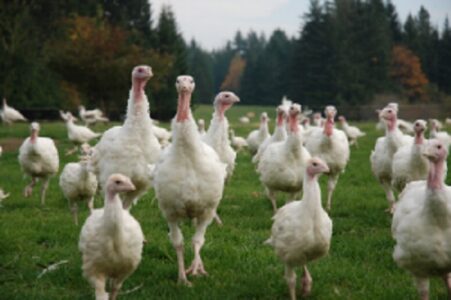Nothing beats a home-raised bird, whether it’s a chicken or a turkey. There is a huge push for meat birds that are raised more naturally. Turkeys and chickens can technically be raised on pasture, but they won’t spend their days eating grass like you might picture a cow doing. Turkeys that are raised on pasture will have a varied diet and will require a little ingenuity to keep them enclosed and safe.
Raising turkeys isn’t difficult and can be a fun experience. Here’s what you need to know about raising turkeys.
What Do Turkeys Eat?
Turkeys are omnivores. This means that naturally, they eat both vegetation and meat. Turkeys don’t eat ‘meat’ but they do consume insects for protein.
About 50-60% of a turkey’s natural diet comes from vegetation. They’ll spend their time eating grasses, seeds and berries. Turkeys prefer to eat the tops of pasture style grasses, or grasses that are 4-6 inches tall. This is probably why you see so many turkeys in fields where cattle, sheep and horses graze.
The remaining 50-40% of their diet will come from insects. Turkeys need the protein and amino acids that are present in the insects. These proteins and amino acids will help fuel the growth for growing turkeys. Young turkeys grow fast and need somewhere around 28% protein to feed this rapid growth.
In the fall and winter, wild turkeys will gorge themselves on acorns from oak trees. This is a favorite food for turkeys in cooler months. You can often find wild turkeys in the woods where large clumps of oaks are.
If you’re planning on pasture raising turkeys, you’ll want to provide them with a mixed ‘pasture.” If you can enclose an area that is both open field and wooded, they will be the happiest and the healthiest. Remember, they want access to both grasses and plenty of bugs. Sometimes the best bugs aren’t in the fields, but in the woods.
Enclosing Turkey Pasture
Creating an enclosure for turkeys can seem difficult. Wild turkeys can fly, but many of the modern, broad-breasted breeds cannot fly. Turkeys can be enclosed with a four-foot fence in most cases. If you’re raising smaller turkeys, like the midget white, or heritage breeds, keep in mind that many of them are accomplished flyers. You’ll need to either completely enclose their pasture with fenced sides and a top or clip their flight feathers.
Clipping flight feathers is easy and doesn’t hurt the birds. Simple trim the primary feathers to the length of the secondary feathers on the wings to prevent flight.
The best way to enclose turkeys is with poultry netting. The holes are small and the birds cannot escape through the fence. If you put up 5 or 6 strands of barbed wire, or even field fencing, your birds won’t stay enclosed. Turkeys can slip through small holes and squeeze between strands of fence.
A strand of electric fencing 12” off of the ground can help deter predators that might make an easy meal of your turkeys.
A group of 12 turkeys is perfect for a small family that is trying to fill their freezer with meat. For 12 turkeys, a 75′ x 75′ space is enough. Of course, the more space you can give them, the better off they will be.
What Do Turkeys Need?
Don’t worry about building your turkeys a coop. They would much rather sleep outdoors than inside. Turkeys enjoy sleeping in a roost at night. They will fly up into trees where they aren’t easily reached by predators. Make sure that your turkey pasture has trees they can get into. If it doesn’t, make them something that they can roost on at night.
You’ll need to provide your turkeys with a constant supply of fresh water. Turkeys grow fast. This rapid growth requires lots of water. Purchase the largest waterers that you can. You can even utilize large, plastic kiddie swimming pools to hold lots of water.
If your turkey pasture is more grasses than a mixture of grass and woods, then you’ll need to provide them with a quality grower feed. This will ensure that they get all of the protein that they need to stay healthy.
Raising turkeys isn’t hard and can be rather enjoyable. Turkeys are personable and curious, making them a lot of fun to raise.
Shelby DeVore is a livestock expert with experience teaching high school agriculture and multiple poultry science teams. Shelby has over 20 years of experience raising poultry for show, meat and eggs. She lives on a farm in west Tennessee with her husband and two children along with too many chickens and turkeys to count.
All MOTHER EARTH NEWS community bloggers have agreed to follow our Blogging Guidelines, and they are responsible for the accuracy of their posts. To learn more about the author of this post, click on their byline link at the top of the page.




